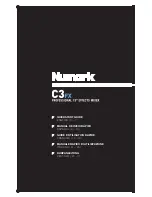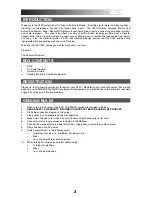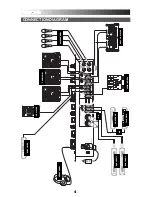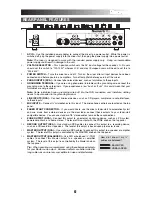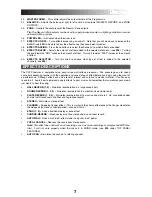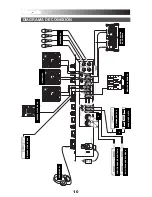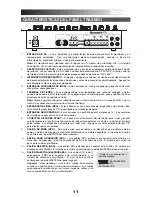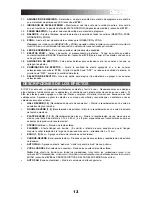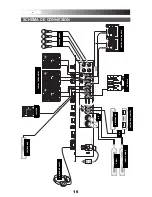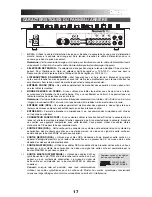
5
How do I know if my ¼”
cables are balanced?
BALANCED
UNBALANCED
REAR PANEL FEATURES
4
4
4
5
5
5
6
6
6
6
7
8
9
10
11
12
1
2
3
1.
AC IN –
Use the included power adapter to connect the mixer to a power outlet. While the power is
switched off, plug the power supply into the mixer first, then plug the power supply into a power outlet.
Note:
The mixer is designed to work with the included power supply only. Using an incompatible
power supply could result in damage to the unit.
2.
VOLTAGE SELECTOR –
This 2-position switch sets the AC input voltage for the speaker. U.S. users
should set this switch to “100-120V” whereas U.K. and most European users will need to set this to
“220-240V”.
3.
POWER SWITCH –
Turns the mixer on and off. Turn on the mixer after all input devices have been
connected and before you turn on amplifiers. Turn off amplifiers before you turn off the mixer.
4.
PHONO INPUTS (RCA) –
Connect phono-level devices, such as turntables, to these inputs.
5.
GROUNDING TERMINAL –
If you are using phono-level turntables with a grounding wire, connect the
grounding wire to these terminals. If you experience a low “hum” or “buzz”, this could mean that your
turntables are not grounded.
Note
: Some turntables have a grounding wire built into the RCA connection and, therefore, nothing
needs to be connected to the grounding terminal.
6.
LINE INPUTS (RCA)
–
Connect line-level devices, such as CD players, samplers or audio interfaces,
to these inputs.
7.
MIC INPUTS –
Connect ¼” microphones to this input. The microphone controls are located on the top
panel.
8.
FADER START CONNECTOR –
If you would like to use the mixer’s fader-start to automatically start
and cue music from external devices via the crossfader, connect these outputs to your fader-start
compatible device. You can use standard 1/8” stereo cables to make these connections.
9.
ZONE OUTPUT (RCA) –
Connect this output to an external monitoring device, such as a PA system,
powered monitors, or a home stereo. The level of this output with the ZONE knob on the top panel.
10.
RECORD OUTPUT
(RCA)
–
Use standard RCA cables to connect this output to a recording device,
such as a CD recorder or tape deck. The level of this output is based upon pre-master levels.
11.
MASTER OUTPUT
(RCA)
–
Use standard RCA cables to connect this output to a speaker or amplifier
system. The level of this output is controlled by the MASTER knob on the top panel.
12.
MASTER OUTPUT (BALANCED) –
Use XLR or balanced ¼” (TRS)
cables to connect this Master output to a speaker or amplifier
system. The level of this output is controlled by the Master knob on
the top panel.
Tip:
When possible, we recommend using these balanced outputs
for your Master audio output. Balanced outputs are better suited for
long cable runs and are less susceptible to noise and interference.

